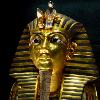

Tuthankamen Tags: Tutankhamun View |
Tutankhamun (alternately spelled with Tutenkh-, -amen, -amon), Egyptian (Egyptian language) langegytwt-?n?-??mn, approx. IPA-allt?wa?t ?a?n?x ?a?ma?n; 1341 BC - 1323 BC) was an Egyptian (Ancient Egypt) pharaoh of the 18th dynasty (Eighteenth dynasty of Egypt) (ruled c.1333 BC - 1323 BC in the conventional chronology), during the period of Egyptian history (History of Egypt) known as the New Kingdom. His original name, Tutankhaten, means "Living Image of Aten", while Tutankhamun means "Living Image of Amun". In hieroglyphs the name Tutankhamun was typically written Amen-tut-ankh, because of a scribal custom that placed a divine name at the beginning of a phrase to show appropriate reverence. He is possibly also the Nibhurrereya of the Amarna letters. He was likely the 18th dynasty (Eighteenth Dynasty of Egypt) king Rathotis who, according to Manetho, an ancient historian, had reigned for nine years ? a figure which conforms with Flavius Josephus (Josephus)s version of Manethos Epitome.
The 1922 discovery by Howard Carter of Tutankhamuns intact tomb (KV62) received worldwide press coverage. It sparked a renewed public interest in ancient Egypt, for which Tutankhamuns burial mask (Death mask) remains the popular symbol. Exhibits of artifacts from his tomb have toured the world. In February 2010, the results of DNA tests confirmed that Tutankhamun was the son of Akhenaten (mummy KV55) and his sister/wife (mummy KV35YL), whose name is unknown but whose remains are positively identified as "The Younger Lady (The Younger Lady (mummy))" mummy found in KV35.
Dynasty: 18th Dynasty (Eighteenth Dynasty of Egypt)
Spouse: Ankhesenamen
Notes: See Tutankhamun#Name
Children: two daughters
Father: Akhenaten
Mother: unidentified mummy, "The Younger Lady (The Younger Lady (mummy))"
Birth Location: 1341 BC
Burial: KV62
Reign: 1333-1324 BC
Predceded by: Smenkhkare? or Neferneferuaten?
Succeeded by: Ay

